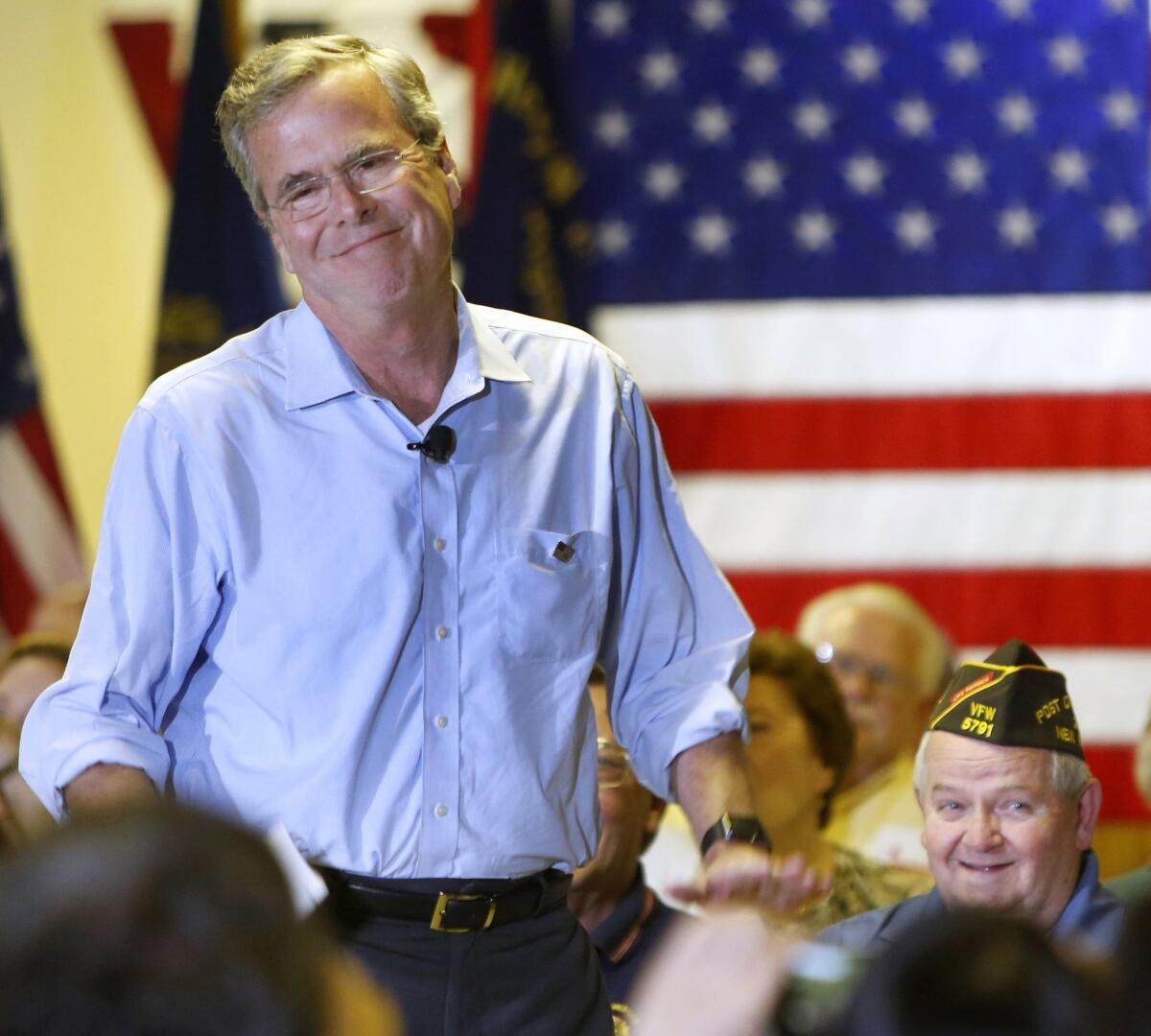Jeb Bush announces unprecedented fundraising haul of $114 million

Republican presidential candidate Jeb Bush speaks at a town hall meeting on July 8, in Hudson, N.H. Bush raised $11.4 million in 16 days after formally launching his campaign for president, his campaign said Thursday.
- Share via
Reporting from Washington — An outside group supporting former Florida Gov. Jeb Bush raised $103 million in the first half of the year, a number that puts him far ahead of his rivals and underscores the increasing dominance of “super-PACs” in the 2016 race for the White House.
Thanks to an aggressive schedule of fundraisers and the built-in advantages of his family’s financial network, Bush and his supporters reached their goal of topping $100 million by this early point in the election cycle -- a number intended to cement his status as the candidate to beat in a crowded field of Republican contenders.
Together with his campaign, which raised $11.4 million in the 16 days after he declared his candidacy last month, Bush’s supporters raised a total of more than $114 million.
As expected, the first numbers put Bush far ahead in the soft-money race. Committees supporting Florida Sen. Marco Rubio say they have raised about $32 million. Supporters of Texas Sen. Ted Cruz say they’ve raised about $38 million. Details of who’s giving the money, and how much, won’t be known until their first reports are filed with federal elections officials later this month.
The super-PAC supporting Bush says it raised money from 9,900 donors, and, in an attempt to show a broad base of support, said that all but about 500 of them wrote smaller checks – which it defined as $25,000 or less. More than $98 million of the money is unspent.
“We are grateful for the overwhelming response from the thousands of donors who have been drawn to Jeb’s optimistic message of conservative renewal and reform,” said Charlie Spies, a longtime GOP fundraiser who is the organization’s treasurer.
The number is far ahead of the pace of fundraising in prior years. For instance, Restore Our Future, the super-PAC for 2012 Republican candidate Mitt Romney, had raised $12 million over the same time period, said Craig Holman, a lobbyist for Public Citizen, an advocacy group.
“The most revealing number will be how many donors made contributions of $1 million or more,” he said in an email. “For Romney, it was four donors. For Bush, we haven’t a clue.”
Unlike donations directly to campaigns, which are capped at $2,700, super-PACs can accept unlimited amounts of money so long as they don’t coordinate directly with campaigns. Likewise, candidates can raise money for their super-PACs, as long as they don’t ask for checks more than $5,000.
But Bush, who delayed his formal entry into the race until June, argued that the limits didn’t apply to him because he technically wasn’t a candidate for most of the first half of the year. That position pushed the boundaries of campaign finance rules, but it has gone unchallenged by the Federal Elections Commission, whose makeup remains deadlocked between Republicans and Democrats.
Bush also is far ahead of leading Democratic candidate Hillary Rodham Clinton, whose campaign raised about $45 million. Clinton has spent most of her attention on courting individuals to write checks for the campaign account, and campaign officials say her first-quarter haul reflects success at building a large and durable network of supporters that will continue to grow.
Her backers also point out that she has faces more-limited primary competition than Bush and will need to spend far less until the general election.
But her supporters have been worried about the lackluster start for the super-PAC supporting her, Priorities USA; hobbled by internal squabbling and a staff shake-up, it’s raised $15.6 million. Clinton, who began the campaign planning to keep her distance from the super-PAC, has since gotten involved in courting donations -- though not as aggressively as Bush.
Some advocates of tighter rules on campaign financing say that big-money donors will have a bigger role in underwriting this election than ever.
“These so-called independent candidate super-PACs are probably going to raise a larger role in financing the Republican presidential primary than the campaigns because they are raising unlimited money,” said Fred Wertheimer, a longtime advocate for tighter regulation of campaign money.
“The fact that the [Federal Elections Commission] is a dysfunctional agency is a license for political operatives to do whatever they want to do, without concern for what the laws require,” he said. “You’re in a Wild West world, without any sheriffs.”
Staff writers Evan Halper and Mark Z. Barabak contributed to this report.
More to Read
Sign up for Essential California
The most important California stories and recommendations in your inbox every morning.
You may occasionally receive promotional content from the Los Angeles Times.











